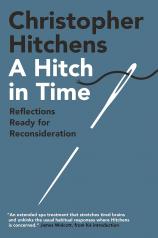A Hitch in Time: Reflections Ready for Reconsideration
Review
A Hitch in Time: Reflections Ready for Reconsideration
The world of political commentary lost one of its most prolific and stimulating members when Christopher Hitchens died in 2011 at the age of 62. Now, thanks to A HITCH IN TIME, readers who enjoyed his often acidic but always eloquent writing can revisit its pleasures.
The 23 entries in this volume (first published in the United Kingdom in 2021) are invariably smart, unabashedly opinionated and frequently witty. As his former Vanity Fair colleague James Wolcott describes him in the book’s foreword, Hitchens was “the last of the living-large two-fisted provocateurs, ready to conquer ideological foes and hecklers alike as a lick of hair flopped over his forehead like Elvis Presley.” Despite all the ways they embody Hitchens’ quintessential qualities, the appeal of a substantial number of the pieces may be diminished for those who aren’t already interested in their subject matter or don’t at least possess some of the knowledge he presumes in his readers.
"The 23 entries in this volume (first published in the United Kingdom in 2021) are invariably smart, unabashedly opinionated and frequently witty."
The majority of these pieces, most of which are book reviews, are selected from Hitchens’ contributions to the London Review of Books between 1983 and 2002, with all but two from the 1990s. Added to this are a smattering of entries labeled “Diary” and a few published letters. Among those that focus exclusively on British political leaders and issues decades in the rear-view mirror are a takedown of two-time Labour Prime Minister Harold Wilson (“a consummate liar and phony”), the role of British espionage in trying to destroy the National Union of Mineworkers (an example of how “deniability has replaced accountability as a principle of our unwritten constitution”), and an unsurprisingly negative assessment of Diana Mosley, wife of the British fascist Sir Oswald Mosley, whose life demonstrated how “vulgar bigotry can be veneered with sophistication.”
But American readers are likely to become more attentive when it comes to a piece like “Brief Shining Moments: Kennedy and Nixon.” It’s a sharp-elbowed critique of the 35th president, a man whom Hitchens --- who moved to the United States in the 1980s, eventually acquiring citizenship in 2007 --- condemns for his “frantically sordid private life” and his “sorry term in office.” In Hitchens’ eyes, Kennedy and his 1960 opponent will be forever linked by the way that “whenever Nixon sought to justify an illegality or an atrocity, he did so by envious and bitter reference to the charming Kennedy ability to commit such crimes and get away with them.”
And as he shows in “A Hard Dog to Keep on the Porch: On Bill Clinton, 1996,” Hitchens holds a president who tried to forge himself in something like Kennedy’s image in similarly low regard. He was casually acquainted with Clinton during his time at Oxford in the late 1960s. He’s critical of what he sees as Clinton’s effort to move the Democratic Party to the center-right and how his “ambition became the same thing as his politics.”
One of the more entertaining and accessible pieces is Hitchens’ account of attending the 1995 Academy Awards ceremony with his 10-year-old son. That was the year Forrest Gump earned six Oscars (to his dismay). He takes the opportunity to deride Hollywood’s “attachment to formula itself; the sort of derivative, poll-driven, synthetic compromise…that is turning out turkey after turkey.” By that standard, things haven’t changed much in nearly 30 years.
In an essay on the weird popularity of spanking in British life, Hitchens recounts his argument with Margaret Thatcher at a book party in the House of Lords two years before she ascended to the office of Prime Minister. It ended with her whacking him on the behind with a rolled-up parliamentary document after he “stooped lower, with an odd sense of having lost all independent volition.” The incident becomes a metaphor for Thatcher’s term as PM: “‘Naughty boy,’ she sang out over her shoulder as she flounced away. Nothing that happened to the country in the next dozen years surprised me in the least.”
One of the delights of just about any Hitchens piece is his willingness to lob verbal grenades in the direction of his targets. Of the public intellectual Isaiah Berlin, he writes that he “sometimes felt or saw the need to be courageous, but usually --- oh dear --- at just the same moment that he remembered an urgent appointment elsewhere.” He describes the late Princess Margaret, the party-loving sister of Queen Elizabeth II, as “the forerunner of the public, vulgar Windsor style” and bemoans the fact that “so much Establishment time has been spent on the ‘containment’ of an averagely-volatile woman from a disadvantaged family.”
Given the volume and variety of work Hitchens produced, it’s unlikely that A HITCH IN TIME will be his final posthumous book. In particular, as James Wolcott points out in his foreword, it will be intriguing to fully assess Hitchens’ advocacy for the Iraq War, which alienated many of his longtime allies on the left. Regardless, he was a brilliant, if undeniably controversial, journalist who’s almost more fun to read when one disagrees with him as when his views align with one’s own.
Reviewed by Harvey Freedenberg on January 3, 2024
A Hitch in Time: Reflections Ready for Reconsideration
- Publication Date: January 2, 2024
- Genres: Essays, Nonfiction, Political Science
- Hardcover: 336 pages
- Publisher: Twelve
- ISBN-10: 1538757656
- ISBN-13: 9781538757659




